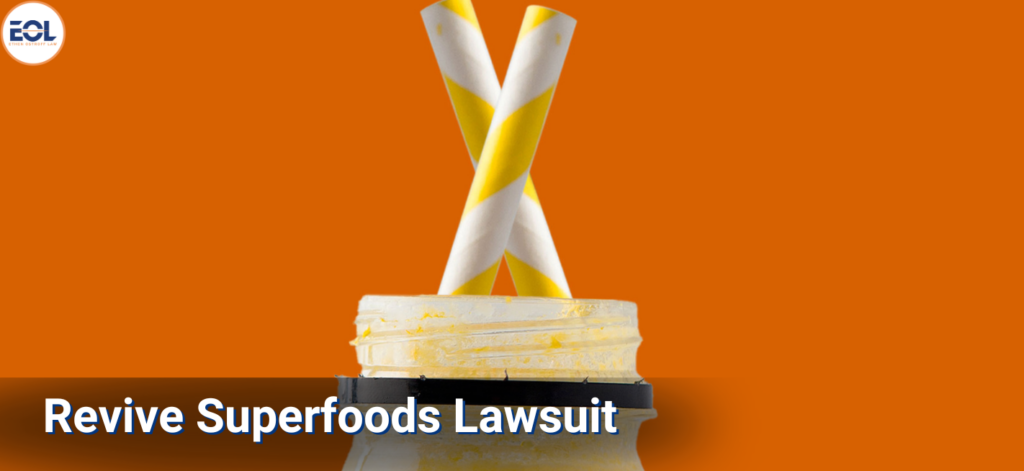Revive Superfoods Smoothies Lawsuit: Tara Flour and Food Poisoning
Recent years have presented substantial challenges for the health food industry, marked by foodborne illness outbreaks linked to products presumed to be wholesome. One notable case that has drawn attention is the Revive Superfoods smoothies lawsuit, bringing into focus the risks associated with certain ingredients, particularly Tara flour. In this comprehensive guide, we delve into the lawsuit, examining the connection between Tara flour and food poisoning, its legal implications, and the support provided to affected individuals by Ethen Ostroff Law.
Revive Superfoods Smoothies: A Rise to Prominence
Revive Superfoods captured widespread attention with its enticing range of nutritious smoothies. Tailored for health-conscious consumers, the company swiftly rose to prominence by innovatively blending flavorful ingredients into convenient grab-and-go packages. These smoothies became increasingly sought after by individuals aiming to integrate wholesome and nutrient-rich options into their daily routines. Revive Superfoods’ unwavering commitment to quality and convenience resonated across a diverse audience, spanning busy professionals, health enthusiasts, and families in search of convenient yet nourishing meal solutions. The brand’s smoothies gained momentum across various social media platforms, further amplifying their popularity and solidifying Revive Superfoods’ position as a significant player in the health food market.
Tara Flour: Source and Safety Concerns
The summer of 2022 marked the beginning of a troubling period for Toronto-based Revive Superfoods. Reports of illnesses linked to the consumption of its smoothie products, particularly the Mango & Pineapple Smoothies, surfaced, echoing a similar crisis faced by Daily Harvest. The common denominator? Tara flour.
Tara flour, sourced from the seeds of a South American legume, emerged in health food products as a plant-based protein source. Unlike its counterpart, Tara gum, Tara flour lacked the FDA’s designation of being “Generally Recognized as Safe.” Despite its increasing popularity in health food circles, concerns lingered regarding Tara flour’s safety, as there was no documented evidence of FDA approval prior to its inclusion in products like Revive Superfoods Mango & Pineapple Smoothies.

The Revive Superfoods and Daily Harvest Lawsuits
The unfolding of the Revive Superfoods lawsuits uncovered notable similarities with the Daily Harvest lawsuits. Both companies confronted accusations of product-related illnesses, with Tara flour identified as the common denominator. Investigations traced the contaminated ingredient back to a shared source: Molinos Asociados, a significant supplier implicated in both outbreaks. This parallel underscores the broader implications of the Daily Harvest lawsuit and its relevance to the ongoing legal actions against Revive Superfoods.
Scientific Findings Post-Outbreak
Following the outbreaks, scientific investigation intensified to identify the root cause of the adverse health effects linked to Tara flour. Studies spotlighted the presence of nonprotein amino acids, particularly Baikiain, in Tara flour, indicating a possible connection to the documented symptoms of food poisoning and liver damage.
Adverse Health Effects
The FDA documented various illnesses linked to the consumption of Revive smoothies, including:
- Acute liver failure.
- Chills.
- Dark urine.
- Elevated liver enzymes.
- Fatigue.
- Gallbladder problems.
- Gallbladder removal.
- Hospitalization.
- Itchy skin (especially hands and feet).
- Jaundice (yellowing of skin and eyes).
- Liver damage.
- Low-grade fever.
- Nausea and vomiting.
- Stomach cramps and pain.
- And more.
Legal Ramifications and Ongoing Investigations
As reported cases escalated, legal actions ensued. Revive Superfoods found itself embroiled in liability and negligence lawsuits, reminiscent of Daily Harvest’s legal challenges. The company faced a pair of federal lawsuits in New York alleging severe illnesses among customers who consumed its pineapple and mango smoothies. These complaints attribute the illnesses to Tara flour, an ingredient derived from the seeds of Tara trees in Peru, used in the drink mix. Filed in the US Eastern District of New York, the lawsuits emerged amidst a series of food poisoning outbreaks, including one involving Daily Harvest, which recently affected hundreds of people. Despite the grievances, Revive Superfoods has not initiated an official recall of the smoothies in question, leaving consumers unaware of potential risks.
What to Do If You're Affected?
Revive Superfoods has offered a $40 voucher for individuals who reported falling ill after consuming Tara flour in Mango & Pineapple Smoothies. However, many have faced substantial medical bills due to liver damage. While it’s uncertain if the Tara flour in Revive smoothies is the same ingredient supplied to Daily Harvest, reported symptoms are strikingly similar in both cases, with many experiencing severe liver damage and gallbladder issues. If you believe you were affected, report your illness to the FDA. You may also be eligible to file a Revive Superfoods smoothies’ lawsuit and pursue financial compensation.

Who to Contact if You Have Symptoms of Foodborne Illness
If you experience symptoms of foodborne illness, contact your healthcare provider promptly to report your symptoms and seek appropriate care. To report a complaint or adverse event related to food, you have several options:
- Call an FDA Consumer Complaint Coordinator if you prefer speaking directly to a person about your issue.
- Complete an electronic Voluntary MedWatch form online.
- Fill out a paper Voluntary MedWatch form and mail it to the FDA.
Information to Be Included in the Report
When reporting illness related to Revive Superfoods smoothies to the FDA, it’s essential to provide thorough and detailed information to aid in their investigation. Here’s what should be included in the report:
- Symptoms: Describe symptoms like acute liver failure, stomach pain, nausea, and jaundice.
- Smoothie details: Specify flavor, date consumed, and packaging info.
- Medical treatment: Detail hospital stays, tests, and medications.
- Contact information: Provide name, address, and phone for follow-up.
- Communication: Note any messages from ReviveSuperfoods.
- Additional details: Include batch numbers, purchase dates, and related products.
Process for Filing Revive Superfoods Lawsuit
Navigating the legal process after Tara flour-related food poisoning from Revive Superfoods involves several key steps:
- Initial consultation: Meet with personal injury attorneys, provide detailed case information.
- Case evaluation: Assess the strength of the case, gather evidence linking illness to Revive super foods products.
- Establishing liability: Prove negligence on the part of Revive Superfoods, such as issues with product sourcing or quality control.
- Filing the lawsuit: Prepare and submit legal documents outlining allegations and damages incurred.
- Discovery phase: Exchange evidence with the opposing party, gather expert testimonies, and conduct depositions.
- Negotiation and settlement: Engage in negotiations with Revive Superfoods to reach a fair settlement that compensates for damages.
- Trial proceedings: If a settlement cannot be reached, proceed to trial where evidence and arguments are presented before a judge and jury.
- Verdict and compensation: Await the court’s decision on liability and the amount of compensation to be awarded if applicable.
- Post-trial actions: Handle any appeals or enforce the judgment as necessary.
- Closure and recovery: Focus on physical and emotional recovery following the resolution of the lawsuit.
Through each step, legal experts guide affected individuals in seeking justice and compensation for Tara flour-related food poisoning.
Causes of Actions in Revive Superfoods Lawsuits
When pursuing legal action against Revive Superfoods for Tara flour-related food poisoning, victims may explore various causes of action, including:
- Breach of warranty: Alleging that Revive Superfoods breached warranties regarding product safety and quality.
- Consumer protection violations: Raising claims of false advertising or unfair business practices under consumer protection laws.
- Failure to warn: Arguing that Revive Superfoods failed to adequately warn consumers about risks associated with their products.
- Fraud and misrepresentation: Pursuing claims if Revive Superfoods misrepresented product safety or engaged in fraudulent practices.
- Negligence: They claim that Revive Superfoods breached their duty of care by not ensuring product safety.
- Product liability: Alleging defects in design, manufacturing, or labeling of Revive Superfoods products.
- Punitive damages: Seeking punitive damages for particularly reckless conduct by Revive Superfoods.
- Strict liability: Holding Revive Superfoods liable for injuries caused by their products, irrespective of fault or negligence.
These legal avenues allow victims to seek compensation and hold Revive Superfoods accountable for Tara flour-related food poisoning. Experienced attorneys can assist in navigating these claims effectively.
Key Eligibility Requirements for Filing a Revive Superfoods Smoothies Lawsuit
Determining eligibility for a Revive Superfoods smoothies lawsuit involves several key factors, including:
- Illness linked to Revive Superfoods smoothies: Experiencing symptoms of food poisoning after consuming their products suggests a potential connection.
- Confirmed contamination with Tara flour: Credible reports confirming Tara flour contamination in the smoothies can strengthen your case.
- Medical documentation: Having medical records supporting your illness is crucial for establishing its extent and linking it to the products.
- Evidence of negligence or wrongdoing: Any evidence of negligence, such as inadequate quality control or failure to warn consumers, strengthens your case.
- Statute of limitations: Being aware of the filing deadlines in your jurisdiction is essential to avoid missing the opportunity to pursue compensation.
- Legal consultation: Seeking advice from personal injury attorneys specializing in foodborne illness cases helps assess your case’s strength and guides you through the legal process.
Promptly seeking legal advice ensures protection of your rights and exploration of compensation options. An attorney can navigate the legal complexities and advocate for your interests effectively.
Compensation Options in Revive Superfoods Tara Flour Lawsuit
In a lawsuit against Revive Superfoods for Tara flour-related food poisoning, compensation varies based on factors like injury severity and case strength. Plaintiffs may seek:
- Legal fees and costs.
- Loss of enjoyment of life.
- Lost income.
- Medical expenses.
- Pain and suffering.
- Punitive damages.
Selecting Legal Representation
As legal and scientific investigations continue, having trustworthy representation is crucial to safeguarding your safety and rights. Choosing the right legal representation is crucial for those pursuing action against Revive Superfoods for damages caused by Tara flour toxicity. Selecting Ethen Ostroff Law ensures access to a team with a proven track record of success in cases like the Revive Superfoods smoothies lawsuit. Our firm’s commitment to informed advocacy guarantees personalized attention and support throughout the legal process. With consumer safety as our top priority, we navigate food safety complexities with expertise and dedication. Contact us today for a free consultation.
Questions Related to Revived Smoothies Lawsuits
Is Tara flour in Revive Superfoods?
Yes, Tara flour was used in Revive Superfoods’ Mango & Pineapple Smoothies. The company has recently removed these smoothies from its website due to safety concerns associated with this ingredient. Numerous customers who consumed the smoothies have reported feeling ill afterward.
Who owns Revive Superfoods?
Revive Superfoods is co-founded by Nour Soliman, Yousuf Soliman, and Anis Barakat. Established in 2018, the company is based in Toronto, Canada.
How long does Revive Superfoods last?
Revive Superfoods meals are crafted to be frozen and can last for an extended period in the freezer. Packaged conveniently for storage, they retain their nutritional value as they’re sourced from top-quality farms and flash-frozen at peak harvest. While it’s recommended to consume all cups within two months of delivery for optimal freshness, they remain safe to eat beyond that timeframe.
How to make Revive superfood smoothies?
To make Revive Superfoods smoothies, you can follow the instructions provided on their website. Here’s the link to their guide: How to make Revive Superfoods smoothies.


